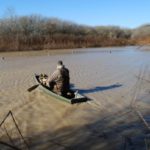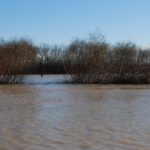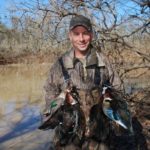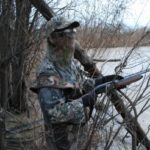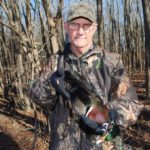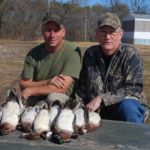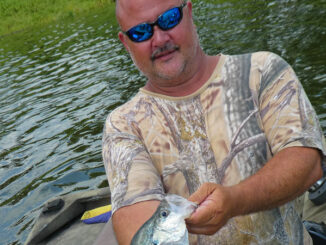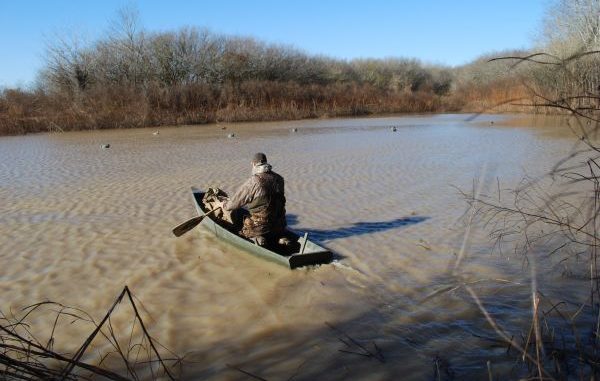
Private leases can provide fantastic duck-hunting opportunities, but the small publicly accessible openings along the Boeuf River are filled with ducks.
I had heard those words before: “Ray Charles could find it.”
The last time I was given the challenge that the great, but completely blind rock-and-roll singer could find his way to where I was being directed was in the days before GPS units and cell phones.
Then I got lost in the boondocks for three hours.
Before I left home, Mike Branton gave me driving instructions. “Just go seven or eight miles out of Sicily Island,” Branton said. “Take a right at Big Dan’s and go about three miles; then hang another right on Bigaplenty Road. Go two or three miles, jump to the top of the levee and go six or seven more miles. The camp is on the left. You can’t miss it. Ray Charles could find it.”
“Yeah,” I thought to myself.
Even though I figured that I’d get lost, I enjoyed the ride. It was a winter scene. Harvested corn, cotton and soybean fields swallowed the arrow-straight roads. Some would have called it a lifeless moonscape. To me, it was a rich bread basket.
Besides, I knew that those wonderful agricultural soils also produced a lot of wildlife in the low spots too wet to plow and along the area’s skein of rivers and bayous.
The snug, two-room camp was right where it was supposed to be, nestled next to another camp smack in the middle of nowhere. I quickly settled in and got to know my partners for the next two days of duck hunting.
Branton, the owner of the camp, is a 46-year-old Pineville native, a retired Army National Guard sergeant first class and currently a general contractor.
A life-long duck hunter, he started hunting with his dad on Catahoula Lake, after which he shifted to Saline (now Dewey W. Wills) Wildlife Management Area.
By 1993, that area became “too crowded” for his liking, and he moved his attention northward to Rodney Island.
“When the Mississippi River is right,” Branton quipped, “you can’t beat (the ducks) out of your decoys.”
In 2006, he purchased the camp he is now using on the Tensas River delta near the confluence of the Tensas River and Bayou Macon. He owns three pieces of property totaling several hundred acres and hunts them often, but a lot of his hunting is in the numerous shallow “potholes,” as he calls them, bordering the Boeuf River, both on Boeuf Wildlife Management Area and in the riverbed across the river.
“At times, the potholes are better than private areas,” he explained. “They can be phenomenal, especially in January when the river is up and more birds are down. Wood ducks in strong numbers can always be depended upon.”
They, along with green-winged teal and gadwall, are considered by the men as “bread and butter” ducks. Mallards and spoonbills make up most of the remainder of the kill.
Pat Bordelon, president of an engineering and manufacturing company in Pineville, has been Branton’s regular hunting partner for two years. Easy going and slow talking, the 56-year-old Marksville native and Pineville resident explained what he called his “passion” for hunting waterfowl.
“I’m still mad at the ducks,” Bordelon said. “I’ve hunted all other species of small and large game, but duck hunting is part of who I am — figuring out what the birds are doing, dealing with the weather, being in the right place at the right time with the right setup.”
Ironically, Bordelon grew up with a non-hunting father.
“Dad grew up during the Depression and hunted for food for the table,” he explained. “He told me that when he didn’t have to hunt any more, he wouldn’t.”
The elder Bordelon stopped hunting, but that didn’t stop the youngster. At 8 or 9, he hunted on family property in Avoyelles Parish. He used home-made cardboard cutouts for decoys, and wore Bunny Bread wrappers on his feet.
By 16, he was able to access Bayou des Glaises Hunting Club land.
After reaching adulthood, he built a camp on the Red River and hunted deer, small game and waterfowl on Grassy Lake, Three Rivers and Red River wildlife management areas. That went on for a number of years until he tired of the hunting pressure.
He sold the camp and joined the Virgin Bend Hunting Club, where he was a member for 10 years.
Nowadays, he hunts on a lease adjacent to Lake Ophelia National Wildlife Refuge and on Iatt Lake, as well as from Branton’s camp.
The pair met through the Rapides Chapter of Ducks Unlimited when they jointly purchased a Manitoba, Canada, duck and goose hunt. Both of their wives are active in DU: Linda Branton was Rapides Chapter chair for two years, and Trenda Bordelon heads the chapter’s fund-raising and donations committee.
The morning after I arrived at the camp was cold. Every breath huffed steam. The pair launched their outboard-propelled boat directly into the Boeuf River from a small private launch. Loaded in the boat with them was an odd-looking wooden paddle boat that looked like a pirogue, but wasn’t one.
Bordelon called it a “jo boat.”
Even in the dark, it was easy by moonlight to see numerous openings through the low willows and dried-up weedy sesbania on each side of the river. At one clearing that looked like all the rest, Bordelon slowed the boat and idled through the opening into an elongated pond surrounded on three sides by trees.
It looked like, well, a pothole.
He idled the boat to a likely looking spot in the trees and brush, and they quickly unloaded their gear.
While Bordelon moved the boat to a nook to hide it, Branton scooted out with the jo boat to set six wood duck and six mallard decoys. The little boat was impressive. It seemed to glide on top of the water rather than cut through it like a traditional pirogue, performance that I suspected was due to the rise in the stern that gave the little craft a push from paddling instead of suction.
Branton pulled the jo boat into the trees about the time that Bordelon returned from hiding the outboard. He turned and looked at his decoy spread with satisfaction.
“Wood duck decoys are my favorite decoy,” Bordelon said. “They work with anything. I think that wood ducks are the smartest duck there is.”
The two men loaded their guns and stepped into the brush at the water’s edge to be able to see better in the poor light. After no more than two minutes, Branton asked mischievously, “Is it time yet? Is it time yet?”
Bordelon slowly shook his head from side to side. Through his face mask, a big grin was visible.
At barely a minute after legal shooting time, a drake wood duck sailed in and unceremoniously plopped down on the edge of the decoys.
“Should I shoot him?” Branton hissed.
Without waiting for an answer — boom!
“That’s the way I like to shoot ’em,” he grinned sheepishly. “Got no BBs in the breast. I like to eat them.”
A pair of woodies tried to slip by, to no avail. Two shots, two dead ducks. Branton zipped out with the jo boat to retrieve them. The little boat was fast and could turn on a dime. I was beginning to like it.
Every few minutes, Branton stepped up the bank to pour a shot of coffee — “aiming fluid,” he called it — for himself. On one trip, he took a sip.
“These little pot holes are good for wood ducks,” he said. “The river’s got plenty of current in it, and they get up in here to feed and pick feathers.”
Wood ducks, with their distinctive cry —“weenk, weenk” — drifted by overhead and all around the hunters in singles, trios and small flocks. After adding a fourth woodie to their bag at 7:20 a.m., the men backed away from the water’s edge into the woods and took seats on their folding dove stools.
“You have to have patience,” Bordelon said softly.
He seemed to relish the uncertainties of duck hunting.
Branton agreed.
“You can manage for deer,” he said. “They ain’t going anywhere. A friend of mine said about ducks, ‘You can set the table, but they might not come.’”
Both men occasionally gave short mallard calls when no ducks were visible.
“Once the birds around here get pressured a lot, you’re best off calling when you don’t see anything rather than when you do,” Branton explained. “It’s like they are looking for a quiet spot.”
The men easily filled their six-bird wood duck limit and retired happy from the field of combat to the camp. Smoked duck was on the menu that night.
The next day was even better than the first because the hunters were able to add green-winged teal to their bag. Hunting with the two men was a kick; they were so much alike, yet so different.
They both showed a fierce intensity while hunting. When a flock of wood ducks buzzed overhead, their quickening pulses were almost audible. Both were crack shots. Misses were few.
But Bordelon is quiet, well-spoken and solid, just what you would expect from a corporate CEO. Branton, on the other hand, is a hyper, crew-cut chatterbox with a mischievous grin. While hunting, he is like a wired-up cat waiting to pounce.
Branton’s electric energy is fueled at least partly by coffee. He hits this thermos regularly, claiming his “aiming fluid … keeps my eye calibrated.”
Both men handled harvested ducks with care, almost reverence. Branton carried a drake wood duck by its bill, smoothing its feathers.
“A friend of mine asked me if I’m readying them for their funerals,” he grinned.
But it’s not that.
“Ducks are so purty,” Branton said, accentuating his North Louisiana accent for his Cajun friend’s benefit.
They filled their wood duck limits early, and when the teal quit flying Branton somewhat sadly announced, “Well, it’s time to call in the dogs and build a fire.”
He grunted when he picked up the game strap.
